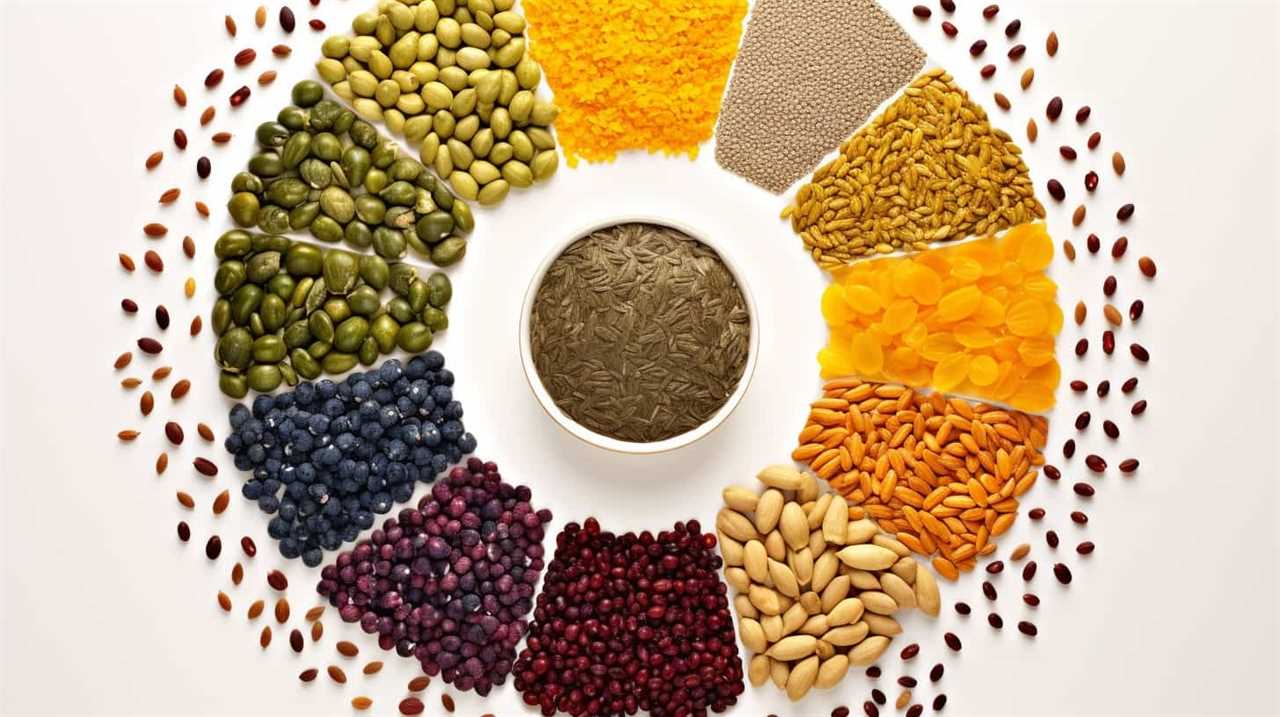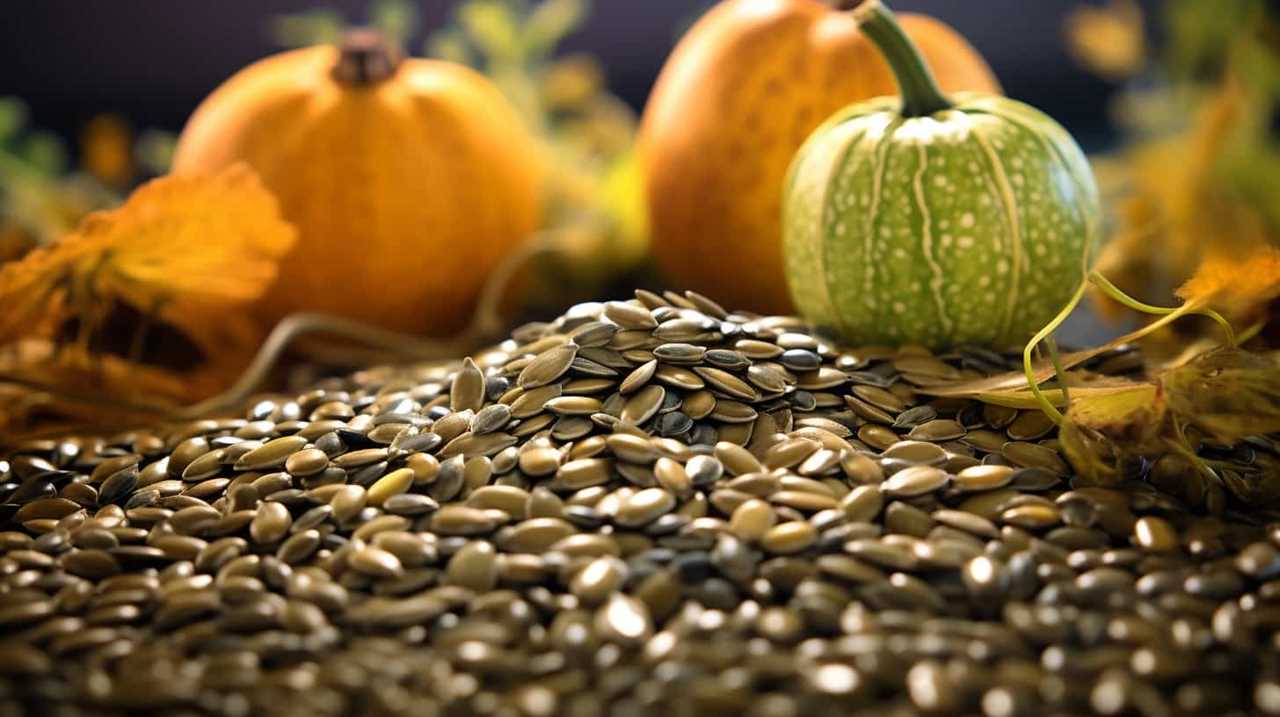Have you ever experienced digestive issues or skin concerns after eating seeds? We’re here to help.
In this article, we’ll explore 14 health risks and allergies that can arise from seed consumption. From respiratory allergies to nutritional imbalances and interactions with medications, we’ll provide you with the information you need to stay informed and make healthier choices.
So, let’s dive in and uncover the potential risks of seed consumption together.
Key Takeaways
- Excessive seed consumption can lead to digestive issues and nutritional imbalances, including bloating, abdominal discomfort, and deficiencies in essential vitamins and minerals.
- Consuming seeds can trigger skin reactions and allergies, ranging from mild irritation to severe allergic reactions. Common seeds known to cause skin irritation include sunflower seeds, pumpkin seeds, and sesame seeds.
- Respiratory allergies can be triggered by excessive seed consumption, especially in individuals with pollen allergies. Symptoms may include coughing, wheezing, and shortness of breath.
- Seeds can interact with medications, affecting their effectiveness and safety. It’s important to be aware of potential drug-seed interactions and consult healthcare professionals or pharmacists for guidance.
Digestive Issues
We have observed that consuming excessive amounts of seeds can lead to digestive issues, such as bloating and abdominal discomfort.

It’s important to note that these digestive issues may be more prominent in individuals with food intolerances or compromised gut health.
Seeds contain certain compounds, such as phytic acid and fiber, which can be difficult to digest for some people. Phytic acid can interfere with the absorption of certain minerals, while fiber can cause bloating and gas if consumed in large quantities.
Additionally, individuals with food intolerances, such as gluten or lactose intolerance, may experience digestive distress when consuming seeds that have been cross-contaminated or processed with allergenic foods.
Therefore, it’s advisable to consume seeds in moderation and be mindful of one’s own digestive health and food intolerances.

Skin Reactions
Moving on from digestive issues, another potential health risk of consuming excessive amounts of seeds is the occurrence of skin reactions. These reactions can range from mild irritation to more severe allergic reactions.
Here are three important points to consider when it comes to skin reactions caused by seed consumption:
-
Irritation causes: Skin reactions can be triggered by various factors, such as the specific type of seed consumed, individual sensitivity, and exposure to other allergens. Some common seeds known to cause skin irritation include sunflower seeds, pumpkin seeds, and sesame seeds.
-
Prevention measures: To prevent skin reactions, it’s important to limit excessive seed consumption and be aware of any known allergies or sensitivities. Additionally, practicing good hygiene, such as washing hands thoroughly after handling seeds, can help reduce the risk of skin irritation.

-
Seeking medical advice: If you experience persistent or severe skin reactions after consuming seeds, it’s crucial to consult a healthcare professional. They can provide a proper diagnosis, recommend appropriate treatment options, and help you manage any potential allergies or sensitivities.
Respiratory Allergies
Continuing from the previous subtopic, a significant concern related to excessive seed consumption is the development of respiratory allergies. People who consume seeds in large quantities may experience respiratory symptoms such as coughing, wheezing, and shortness of breath.
These symptoms can be attributed to the presence of allergens in seeds, such as pollen. For individuals with pollen allergies, consuming seeds can trigger an allergic reaction in the respiratory system. The body’s immune system mistakenly identifies the proteins in the seeds as harmful invaders and releases chemicals that cause inflammation in the airways. This inflammation leads to the typical respiratory allergy symptoms.
It’s important for individuals with pollen allergies to be cautious when consuming seeds and to consult with healthcare professionals to determine safe consumption levels.

Nutritional Imbalances
One potential concern associated with consuming excessive amounts of seeds is the risk of developing nutritional imbalances. While seeds are generally rich in certain nutrients, consuming them in excess can lead to nutrient deficiencies and metabolic disorders.
Here are three important points to consider:
-
Nutrient deficiencies: Consuming large quantities of seeds can displace other nutrient-rich foods from our diet, leading to deficiencies in essential vitamins and minerals such as calcium, iron, and vitamin D.
-
Imbalance of omega-6 and omega-3 fatty acids: Seeds are often high in omega-6 fatty acids, which are important for our health. However, an excessive intake of omega-6 fatty acids without a proper balance of omega-3 fatty acids can lead to inflammation and other health issues.

-
Phytic acid and mineral absorption: Seeds contain phytic acid, which can interfere with the absorption of certain minerals like iron, zinc, and calcium. This can contribute to nutrient deficiencies and negatively impact overall health.
Understanding and addressing these potential nutritional imbalances is crucial for maintaining optimal health.
Transitioning into the next section, let’s explore another important aspect of seed consumption: interactions with medications.
Interactions With Medications
As we delve into the topic of interactions with medications in relation to seed consumption, it’s important to consider the potential effects and risks that can arise.

Consuming seeds, while generally considered healthy, can have interactions with certain medications. It’s crucial to be aware of these potential drug interactions to ensure your safety and the effectiveness of your medication.
Some seeds contain compounds that can interfere with the absorption or metabolism of certain drugs, leading to altered blood levels and potential side effects. For example, flaxseeds and chia seeds contain high amounts of fiber, which can delay the absorption of medications taken orally.
Additionally, some seeds may interact with blood thinners, affecting their effectiveness or increasing the risk of bleeding.
It’s essential to consult with your healthcare provider or pharmacist to determine if seed consumption could potentially interact with your medications and to ensure the best outcomes for your health.

Frequently Asked Questions
Can Consuming Seeds Lead to Weight Gain or Obesity?
Consuming seeds can contribute to weight gain or obesity due to their high calorie content. It’s important to consider portion sizes and incorporate seeds as part of a balanced diet for effective weight management and to understand the metabolic implications.
Are There Any Seeds That Are Known to Cause Heartburn or Acid Reflux?
Seeds can cause gastrointestinal issues such as heartburn or acid reflux. It’s important to be aware of the potential health risks of seed consumption, as some individuals may be more susceptible to these symptoms.
Can Eating Seeds Result in Hair Loss or Other Changes in Hair Texture?
Yes, eating seeds can potentially result in hair loss or other changes in hair texture. It is important to consider the potential effects on hair health when incorporating seeds into your diet.
Are There Any Seeds That Can Cause an Allergic Reaction in the Eyes?
Seeds can cause eye allergies and irritation. It’s important to be aware of the specific seeds that may trigger these reactions and to take necessary precautions to protect our eyes.

Do Certain Seeds Have the Potential to Interact Negatively With Antidepressant Medications?
Certain seeds have the potential to interact negatively with antidepressant medications. It’s important to be cautious and consult with a healthcare professional before consuming seeds while taking these medications. Seed consumption can also have effects on mental health.
Conclusion
In conclusion, it’s important to be aware of the potential health risks and allergies associated with seed consumption. While seeds can provide numerous health benefits, such as essential nutrients and fiber, they can also lead to digestive issues, skin reactions, and respiratory allergies in some individuals.
It’s crucial to listen to your body and consult with a healthcare professional if you experience any adverse reactions. Remember, knowledge and moderation are key when incorporating seeds into your diet.
















